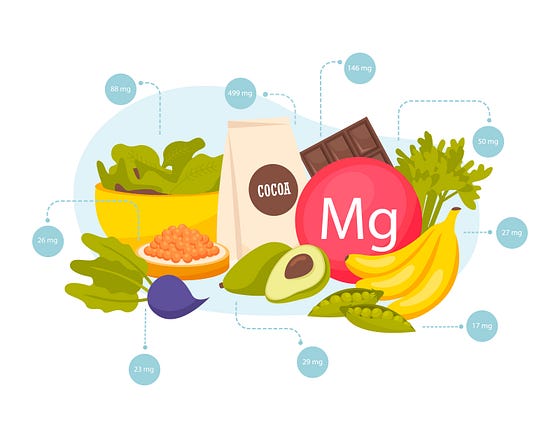Why Your Body Can’t Function Without Magnesium
Magnesium is one of the most essential minerals your body needs to stay healthy. Even in small amounts, it plays a crucial role in almost every system, from supporting your muscles, heart, and brain to maintaining metabolism and overall balance.
This mineral is involved in over 300 biochemical reactions, including regulating hormones, supporting stress resilience, aiding digestion, and keeping muscles relaxed. Without sufficient magnesium, your body may feel tired, tense, or mentally foggy. Magnesium is also critical for mental health, helping manage stress, improve mood, and support restorative sleep.
Your heart, bones, and joints rely on magnesium to stay strong. It supports normal heart rhythm, helps maintain blood pressure, strengthens bones, and promotes healthy joints. Magnesium also aids the immune system, helping your body fight off infections and recover faster.
Why Magnesium is Vital for Your Body

Magnesium is often called a master mineral because it’s involved in hundreds of processes that keep the body functioning efficiently. It supports hormone balance, regulates stress responses, enhances nutrient absorption, promotes detoxification, and keeps muscles and nerves working smoothly.
Without enough magnesium, these processes slow down, which can lead to fatigue, joint discomfort, hormonal imbalance, poor focus, and low energy. Eating magnesium-rich foods ensures your body functions optimally, helping you stay energized, balanced, and healthy every day.
Key Benefits of Magnesium
1. Supports Stress Management and Hormonal Balance
Magnesium regulates the stress-response system, helping the body manage cortisol and other stress hormones. Adequate magnesium improves mood, reduces anxiety, and supports overall emotional balance. It also helps regulate hormones that control energy, metabolism, and reproductive health.
2. Promotes Joint and Muscle Comfort

Beyond preventing cramps, magnesium supports joint flexibility and recovery. It aids connective tissue health, reduces inflammation, and helps muscles recover faster after exercise or physical activity. This makes magnesium essential for active individuals, athletes, and anyone looking to maintain mobility.
3. Enhances Cognitive Function
Magnesium is critical for learning, memory, and focus. It helps regulate neurotransmitters, improves nerve signaling, and protects brain cells from stress-related damage. Adequate magnesium levels can reduce mental fatigue, improve attention, and support long-term brain health.
4. Supports Heart and Circulatory Health

Magnesium helps maintain healthy blood pressure, proper heart rhythm, and blood vessel flexibility. It reduces strain on the cardiovascular system and supports circulation, lowering the risk of heart complications. This benefit is vital for long-term heart health and overall energy.
5. Boosts Metabolism and Digestion
Magnesium supports enzyme function in the digestive system, helping break down carbohydrates, fats, and proteins efficiently. It also assists in stabilizing blood sugar levels, reducing fatigue, and ensuring steady energy throughout the day.
6. Strengthens Bones and Teeth
Magnesium works with calcium and vitamin D to maintain bone density and dental health. Adequate magnesium helps prevent age-related bone loss and supports lifelong skeletal strength.
7. Promotes Deep, Restorative Sleep

Magnesium relaxes muscles and nerves, helping the body enter a restful state for quality sleep. It regulates sleep-related neurotransmitters and hormones, ensuring your body can recharge effectively each night.
8. Supports Detoxification
Magnesium aids the liver and kidneys in removing toxins efficiently, keeping the body’s internal systems balanced. It supports energy production by helping the body use its resources more effectively and reduces the feeling of sluggishness.
Sources of Magnesium
Magnesium is an essential mineral that our body cannot produce on its own. To maintain healthy levels, it’s important to include magnesium-rich foods in your daily diet. These foods help support bones, muscles, heart, brain, digestion, and overall wellness.

1. Leafy Green Vegetables
Leafy greens like spinach, kale, Swiss chard, and collard greens are excellent sources of magnesium. They also provide calcium, vitamins, and antioxidants, supporting strong bones, healthy muscles, and a healthy heart.
2. Nuts and Seeds
Nuts and seeds, including almonds, cashews, pumpkin seeds, sunflower seeds, and chia seeds, are magnesium powerhouses. They also deliver healthy fats, protein, and fiber, supporting energy, brain function, and muscle health.
3. Whole Grains
Whole grains such as oats, quinoa, brown rice, barley, and whole wheat provide magnesium and fiber for healthy digestion. Choosing whole grains over refined grains ensures steady energy and improved metabolic health.
4. Legumes
Legumes like lentils, chickpeas, black beans, kidney beans, and soybeans are rich in magnesium and plant-based protein. They help support blood sugar balance, digestion, and sustained energy, making them ideal for vegetarians and vegans.
5. Fish and Seafood
Fish such as salmon, mackerel, tuna, and halibut are good sources of magnesium and omega-3 fatty acids, which support heart and brain health. Regular fish intake contributes to cardiovascular wellness and overall vitality.
6. Fruits
Fruits like bananas, avocados, figs, and blackberries provide magnesium along with natural antioxidants and healthy fats, aiding energy production, brain function, and heart health.
7. Dark Chocolate
Dark chocolate (70% cocoa or higher) is a delicious source of magnesium and antioxidants. A small daily portion can support mood, energy levels, and overall mineral intake.
8. Dairy and Eggs
Dairy products such as milk, yogurt, and cheese, along with eggs, provide magnesium along with calcium, protein, and essential vitamins, making them a valuable part of a balanced diet.
Final Thoughts
Magnesium is essential for every aspect of your health, from mental clarity and energy production to joint comfort, heart health, hormone balance, and sleep quality. Without it, your body cannot function optimally.
Incorporating magnesium-rich foods into your daily diet, along with lifestyle practices like staying active and managing stress, ensures your body stays balanced, energized, and resilient. Small, consistent steps — like adding nuts, leafy greens, seeds, and seafood — can make a big difference over time.
Take charge of your health today by making magnesium a daily habit and experience the benefits of better energy, stronger joints, sharper focus, and overall wellness.
For More Tips Follow: Be Weird


Comments
Post a Comment